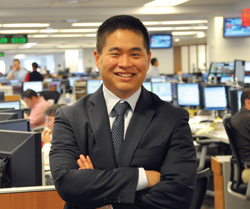(Bloomberg) — Bats Global Markets Inc.s merger with Direct Edge Holdings LLC will put a broker-owned stock exchange operator in the top ranks on Wall Street for the first time sinceNYSEEuronext and Nasdaq OMX Group Inc. went public.
The Securities and Exchange Commission approved the combination and the company expects to close the transaction within days, Bats said today in a statement. The merged Bats Global Markets, whose owners include Goldman Sachs Group Inc., Morgan Stanley, Credit Suisse Group AG, Citadel LLC, Citigroup Inc. and KCG Holdings Inc., will run four exchanges that claim more than 20 percent of daily equity volume to challengeNYSEfor the most market share.
NYSEand Nasdaq, which converted to public companies about a decade ago, have battled growing competition from Bats and Direct Edge as well as alternative trading venues run by some of the same Wall Street firms that once owned them. Combining the broker-owned exchanges will only heighten the threat, according to Brad Katsuyama, chief executive officer of IEX Group Inc., which runs a dark pool aimed at large investors.
The combination of Bats and Direct Edge now has all the large brokers sitting around the same table, which is definitely not a positive thing forNYSEand Nasdaq given the percentage of orders concentrated with these brokers, said Katsuyama, whose IEX venue plans to become an exchange.

Until 2003, the heads of 10 brokerages regulated by theNYSEsat on the exchanges board and half the NYSEs 12 public directors were presidents, CEOs or former CEOs of firms that traded on the exchange.
Changed Model
As markets evolved,NYSEand Nasdaq changed the model that had prevailed on Wall Street since traders in 1792 formed what would become theNYSE. In part pushed by competitive pressures from new trading venues, the companies went public and listed their shares on their own exchanges.NYSEwas acquired by Atlanta-based IntercontinentalExchange Group Inc. in November.
For centuries we had essentially mutual ownership of the exchanges, Justin Schack, partner and managing director for market structure analysis at Rosenblatt Securities Inc., said in a phone interview. We had a brief period in which we moved away from that because the two major market centers felt threatened by smaller and more nimble challengers.
Bats and Direct Edge have used the power of that mutual structure to take market share away fromNYSEand Nasdaq, according to Schack.
Bats considers its ownership structure a positive.
Customer Aligned
We see ourselves as aligned with our customers and working for their best interests, Randy Williams, a Bats spokesman, said in phone interview. Were not sure that our legacy competitors look at things in the same way.
Eric Ryan,NYSEspokesman, declined to comment, as did Nasdaq spokesman Rob Madden.
NYSEhas previously described the competitive threat from its former members.
Many of our key customers are prioritizing their internalization and ATS businesses ahead of their exchange-based market-making business, the company wrote in its final quarterly report before the ICE acquisition in November, referring to the practice of trading firms matching buyers and sellers internally or trading on alternative venues other than exchanges. Banks and brokers also trade directly with each other, another way they avoid the exchanges,NYSEsaid.
Only Counterweight
The only counterweight to this concentration of orders is the clients themselves, the investment managers, and where they ultimately want to direct their orders, IEXs Katsuyama said. After all, its their right to choose.
Joe Ratterman will remain chief executive officer of Bats Global Markets, while Direct Edge CEO William OBrien will be president.
Lenexa, Kansas-based Bats started trading in 2006 with the aim of matching the incumbent public markets on speed and beating them on prices. It was founded by high-frequency trader Dave Cummings of Tradebot Systems Inc. Direct Edge, based in Jersey City, New Jersey, was wholly owned by Knight Capital Group before it was spun off in 2007. Knight last year merged with high-frequency trading firm Getco LLC, which held a stake in Bats, to form KCG.
Rule changes also affected the business models. Regulation NMS, which came into effect in 2007, said orders had to be sent to whichever platform offered the best price. Boosted by Reg NMS, broker-run alternative venues known as dark pools have grown and as much as 40 percent of daily trading now takes place away from public markets.
Dark Pools
Dark pools made up about 14 percent of volume in December, according to Rosenblatt, whose data show the largest of the venues are owned by the same firms who own the new Bats, such as Goldman, Morgan Stanley and KCG. Credit Suisses dark pool was also among the biggest venues, though the firm stopped reporting its data to Rosenblatt last year.
The brokerage industry is pressing for more changes. The Securities Industry and Financial Markets Association last year urged the government to strip exchanges of their status as self- regulatory organizations, which puts them in the position of overseeing some of the same firms that also run alternative trading platforms.
Conflicts of interest in this model abound and only worsen as they are left unresolved, Theodore R. Lazo, associate general counsel at Sifma, wrote in a letter last year to the SEC.



